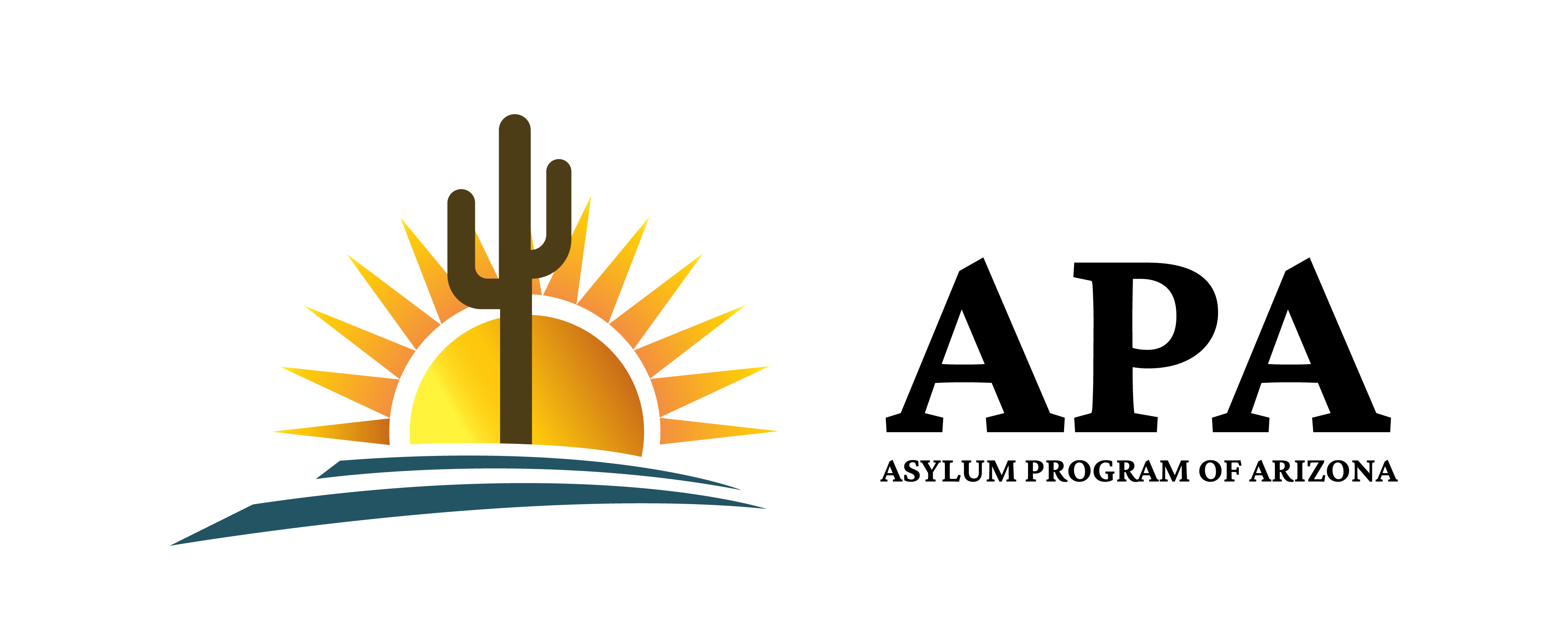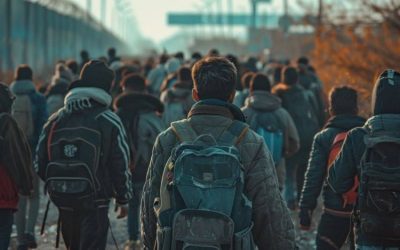By Collaboration of Board Members of APA
May 15, 2024
Individuals seeking humanitarian protection such as asylum – even those who enter after having secured one of a limited number of coveted appointments available to asylum seekers at U.S. ports of entry – often find themselves in a legal labyrinth, where the difference between safety and deportation hinges on legal technicalities. This blog advocates for the vital necessity of legal representation for these individuals, with an emphasis on the role played by the Asylum Program of Arizona (APA).
Who Qualifies for Asylum?
The criteria for asylum seekers seeking refuge in the United States have become increasingly stringent, necessitating an understanding of the qualifications and nuances involved. Here’s a basic breakdown of who may qualify for asylum:
Asylum Qualifications
Individuals who have endured “atrocious” persecution in their home countries or harbor a “well-founded fear of persecution” due to one or more of the following factors may be eligible for asylum:
- Race: Persecution based on race, ethnicity, or skin color.
- Religion: Extreme discrimination or oppression based on religious beliefs or affiliations.
- Nationality: Targeting individuals based on their nationality or belonging to a specific country.
- Membership in a Social Group: Persecution based on belonging to a particular social group can encompass a wide range of identities based on factors such as gender, sexual orientation, or membership in a specific community. The group must have clear boundaries and be recognized by the particular society as a group. One example is women from a certain country who are unable to get out of a domestic relationship.
- Political Opinion: Persecution due to one’s political views or affiliations.
These five “protected grounds” are set forth in the United Nations’ 1951 Refugee Convention, supplemented by its 1967 protocol and were incorporated into U.S. statutes in 1980.
Asylum seekers also must show that their government either is their persecutor or is unable or unwilling to protect them from persecution. In addition, they must apply within one year of entering the U.S., with exceptions granted only in limited circumstances. Certain conduct – such as commission or conviction of certain crimes, persecution of others, or provision of aid to terrorists – bars a person from being eligible for asylum.
Significantly, spouses and minor children accompanying the applicant may qualify for protection as “derivatives” of the principal asylum seeker.
Withholding of Removal (“Withholding”)
Withholding of removal is a term for the right of a refugee not to be sent back to a country in which their life or liberty will be at risk. Like asylum, it applies based on threats of persecution on account of one of the five protected grounds.
While the qualifying criteria are similar, the likelihood of persecution must be higher: the Supreme Court ruled that persecution must be “more likely than not,” as opposed to as low as a one in ten chance of persecution for asylum. Counterintuitively, the benefits are more limited: unlike asylum, withholding is not a legal “status,” cannot be a basis for becoming a permanent resident (nor ultimately, a US citizen), and does not offer protection for spouses and children. However, withholding is mandatory for those who qualify, whereas immigration judges and asylum officers may deny asylum in a reasonable exercise of discretion.
Qualifications for CAT (Convention Against Torture)
Individuals who fear torture if deported to their home countries may seek protection under the U.N. Convention Against Torture (CAT). To qualify for CAT protection, they need not show a risk of harm based on any specific ground. Instead, they must show more than a fifty percent chance that if deported, they be subject to torture, which is defined to include these salient criteria:
- Severe Pain or Suffering, whether mental or physical
- Intentionally Inflicted
- Government Involvement: the acts must be inflicted by or with the consent or acquiescence of a public official.
There are two types of CAT protection, neither of which leads to legal status, and neither of which provides protection for spouses or children. One has the same bars and benefits as withholding of removal under the Refugee Convention, whereas the second has no bars at all but also provides a more tenuous form of protection that is easier for the government to revoke.
Understanding the criteria for and differences between these three forms of humanitarian protection is crucial for those seeking safe haven. The existence of countless nuances in the laws, terms, and procedures underscores the necessity of legal assistance in navigating the complex application process.
Overcoming Obstacles in Pursuit of Asylum
Those Deserving of Protection in a Moral Sense Don’t Always Qualify in a Legal Sense
A close look at the criteria for protection reveals a stark dissonance between moral imperatives and legal criteria. Many individuals who have endured harrowing experiences and face genuine threats in their home countries find themselves ineligible for asylum due to strict legal requirements. This disheartening reality underscores the need for legislative reforms as well as for heightened access to legal representation.
Overcoming Obstacles
Applicants face a myriad of obstacles to pursing their claims for legal protection, including trauma, language barriers, financial constraints, and evidentiary challenges. Legal representation serves as a lifeline in navigating these hurdles and advocating for their rights effectively.
There are many reasons why individuals who have endured persecution or violence and qualify for protection may not be able to prove their eligibility:
- Trauma and Psychological Barriers: Many asylum seekers have experienced significant trauma – including persecution, violence, and human rights abuses – in their home countries and/or in their arduous journey to the U.S, This trauma can have long-lasting psychological effects, making it difficult for them to recount their experiences or engage effectively in the asylum process. Access to mental health support and trauma-informed legal services is essential in helping asylum seekers overcome these barriers and present their cases coherently.
- Challenges in Obtaining Evidence: Gathering and presenting evidence to support an asylum claim can be challenging, particularly for individuals who have fled their home countries under duress. Obtaining documentary evidence, such as police reports, medical records, or witness statements, may be difficult or impossible due to political instability, censorship, or lack of access to documentation. Legal assistance in gathering and documenting evidence is crucial to overcoming evidentiary challenges.
- Limited Understanding of Legal Process: Many asylum seekers may lack awareness of the complex legal requirements and procedures involved in the application process. Without adequate legal guidance, they may struggle to present their cases effectively or provide the necessary evidence to meet the legal standards.
- Inaccessibility of Legal Assistance and Financial Constraints: Many asylum seekers face financial constraints that limit their ability to access legal assistance. Legal representation is typically costly, and individuals with limited financial resources may struggle to afford competent legal counsel. Pro bono legal services, legal aid organizations, and funding for indigent asylum seekers are critical in ensuring access to legal representation and safeguarding the rights of vulnerable individuals.
- Subjectivity in Decision-Making and Inconsistent Application of Laws: Asylum decisions are often subjective and vary depending on the interpretation of cases, statutes, and regulations and on the perspectives and biases of asylum officers or immigration judges. As a result, individuals with similar circumstances may receive different outcomes depending on where their case is heard and the prevailing legal precedents in that jurisdiction. Legal advice and assistance is critical in determining where to pursue one’s claim, how to most effectively articulate and present it, and how to challenge a wrongful denial.
- Overcoming Language Barriers: Language barriers present a significant challenge for asylum seekers, particularly those who are not proficient in English. Limited proficiency in English can impede communication with legal representatives, understanding of legal proceedings, and articulation of claims. Providing access to interpretation services and bilingual legal professionals can help mitigate these barriers and ensure that asylum seekers can fully participate in the asylum process.
Legal representation plays a crucial role in enabling protection seekers to overcome challenges and pursue their claims. By addressing trauma, language barriers, financial constraints, and evidentiary challenges, legal professionals can help asylum seekers navigate the complex legal system and access the protection they deserve. It is imperative to recognize the importance of comprehensive support services and increased access to legal representation in ensuring a fair process for all those seeking refuge in this country.
APA’s Vital Role in Legal Representation
The Asylum Program of Arizona (APA) plays a crucial role in providing support and legal assistance to asylum seekers navigating the asylum process. Through its comprehensive services and dedicated advocacy, APA addresses the needs of vulnerable individuals fleeing persecution and seeking safety in the United States.
Advocacy for Vulnerable Individuals
APA works tirelessly to advocate for the rights of asylum seekers and provide them with the necessary resources to pursue their claims effectively. By prioritizing individuals who face the greatest challenges and are most in need of protection, APA ensures that vulnerable populations receive the support and representation they deserve.
Financial Support and Legal Assistance
Given that financial constraints pose a significant barrier for asylum seekers seeking legal representation, APA provides financial support to individuals who cannot afford legal services on their own. This assistance enables asylum seekers to access the expertise of experienced attorneys and present their cases effectively before immigration authorities.
Fighting Against a Stacked System
The asylum system is fraught with challenges and barriers that disproportionately impact vulnerable individuals seeking protection. APA understands the systemic injustices inherent in the asylum process and recognizes that the best way to combat these obstacles is through legal representation. By providing skilled attorneys who advocate zealously on behalf of asylum seekers, APA helps level the playing field and ensures that individuals have a fair chance at securing protection from persecution.
Conclusion
In conclusion, the journey towards asylum for undocumented immigrants is fraught with challenges, underscoring the critical need for fair representation and compassionate policies. The Asylum Program of Arizona (APA) stands as a vital resource in this endeavor, providing support and legal assistance to those navigating the complexities of the asylum process.
However, the current system often fails to ensure equitable representation, leaving many deserving individuals without the protection they urgently need. Deciding who receives representation shouldn’t be akin to arbitrary decisions made by a privileged few. It’s comparable to old white men making health care decisions for women.In a perfect world, everyone would receive a fair and just opportunity for asylum. We shouldn’t even have to meticulously decide who should qualify for a fair chance at asylum but we must based on our current system. It’s imperative that we advocate for comprehensive reform that guarantees fair and equal access to legal representation for all asylum seekers.
APA’s advocacy serves as a reminder of the importance of upholding humanitarian values and respecting the rights of those seeking refuge. By learning from models like Canada’s and prioritizing fair representation, we can move closer to realizing a system that ensures justice and protection for all individuals fleeing persecution. Let’s work together to build a future where everyone, regardless of their circumstances, has the opportunity to seek safety and security with dignity and respect.



